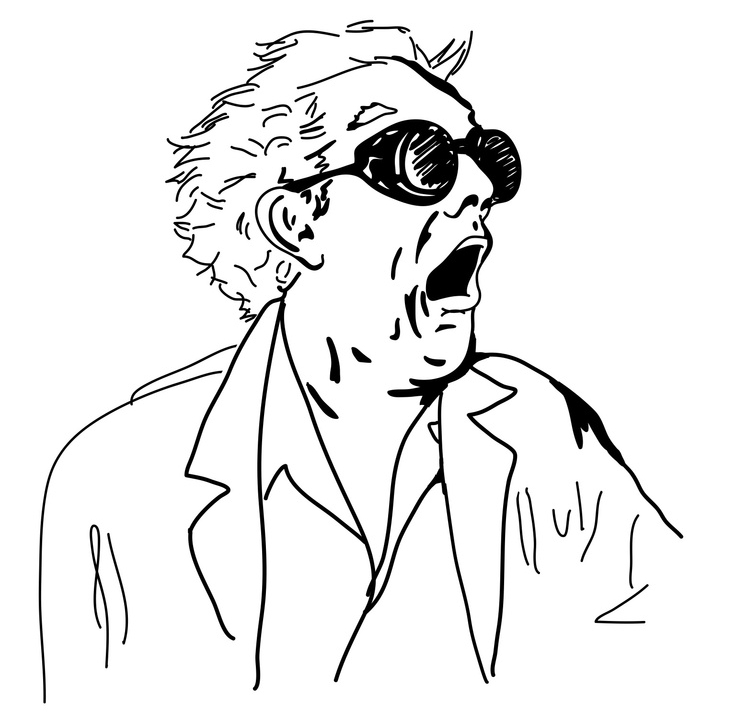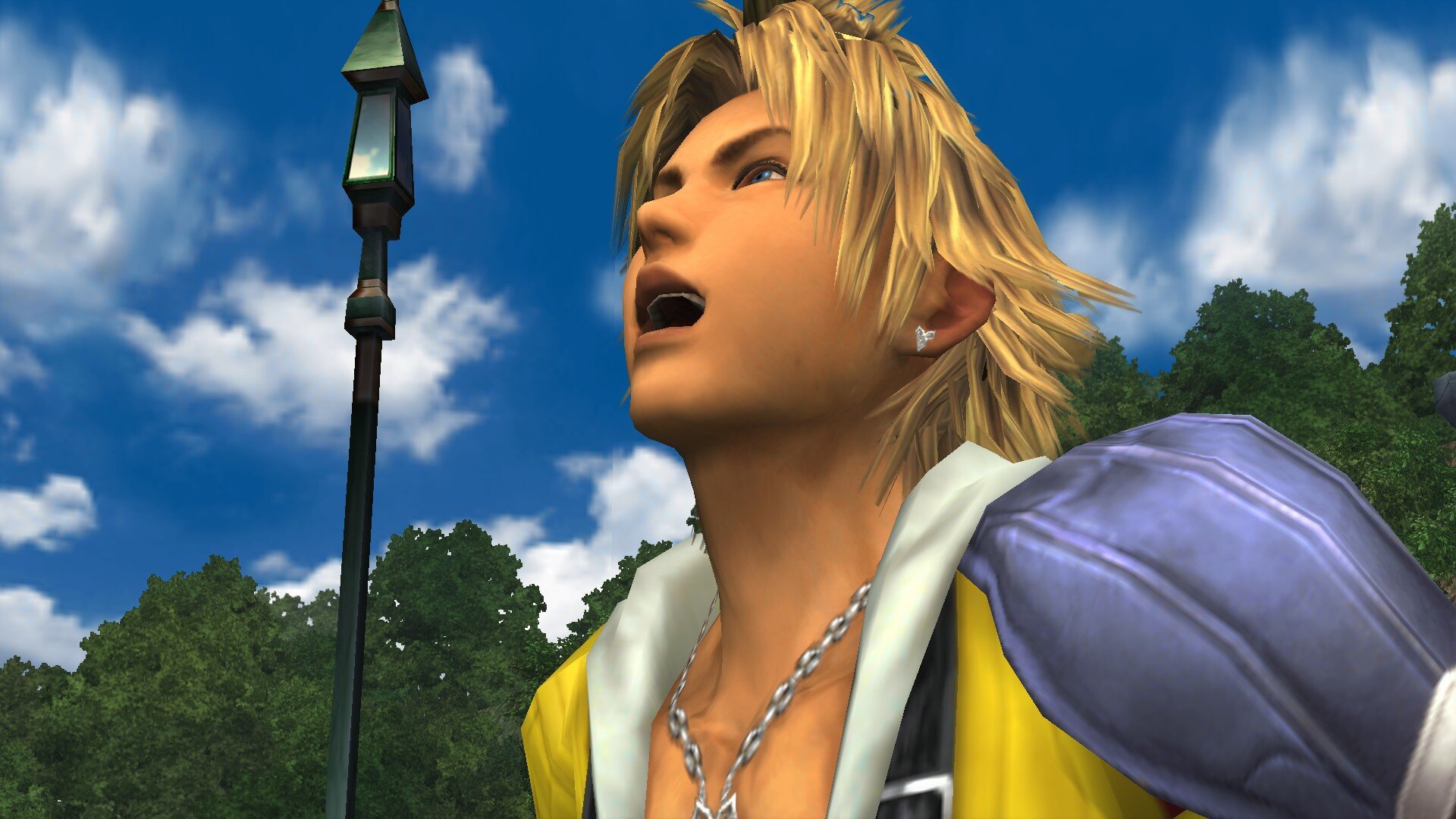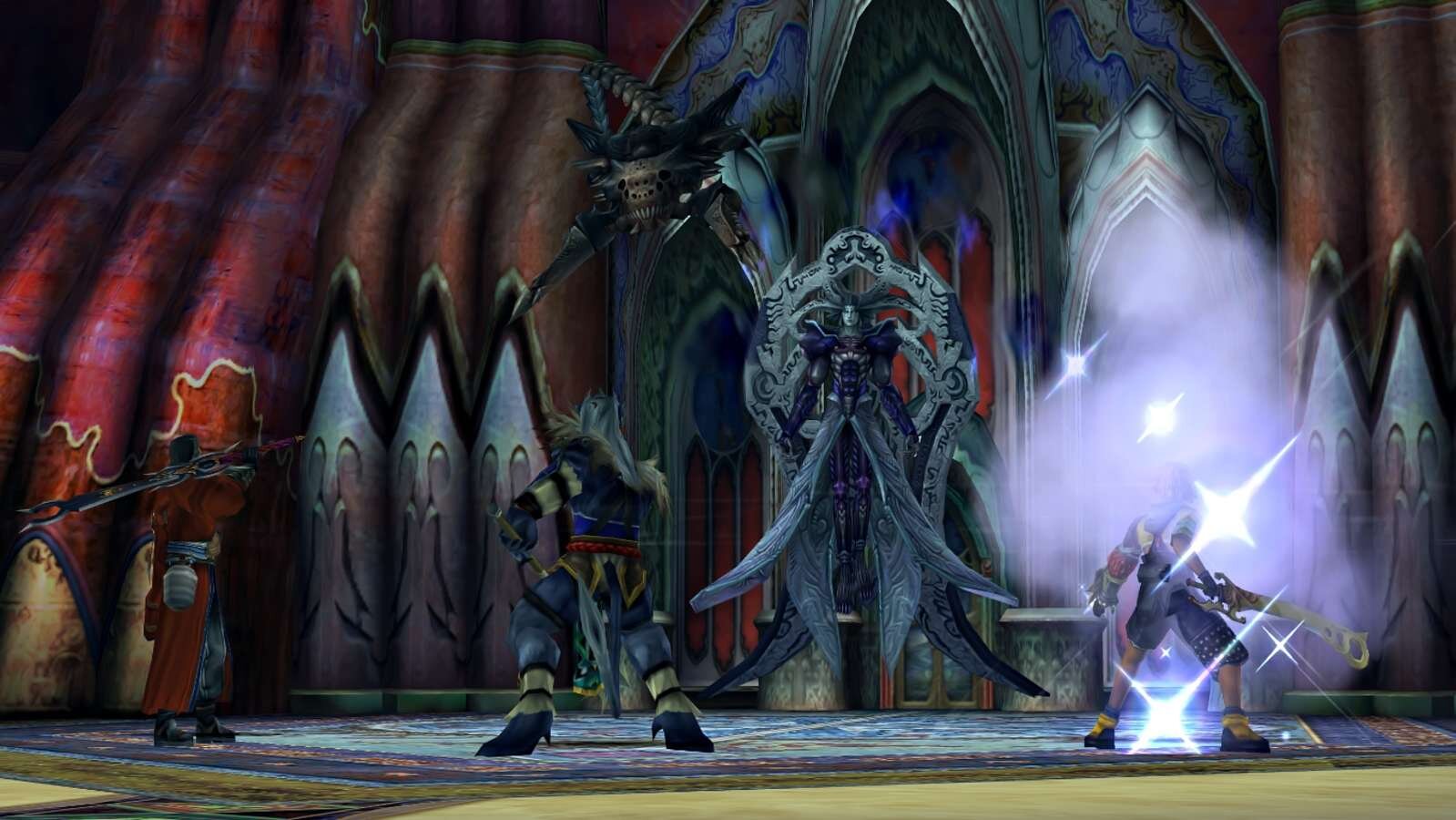Sometimes, the Last Boss Wins.
Final Fantasy X HD Remaster might have just broken my spirit. I went into it so optimistic, so sincerely stoked to relive what I assumed was some kind of crucial high school revelation and bask in widescreen, razorsharp graphics, that it’s easy to see now that I was setting myself up for certain failure. I was doomed, man. I cast Doom on myself.
My first problem is the most obvious one: I didn’t even like Final Fantasy X when it dropped in 2001. I may not have fully realized or remembered that critical fact when I kicked off this 2015 playthrough, maybe because Final Fantasies VI through IX occupy a special, airship-shaped space in my heart, and so I just assumed that X probably did too. But now I’m thinking maybe it didn’t. In some ways, it’s comforting to know that my high school self was streetwise enough to recognize some bullshit when he came across it. If I’d been asked what my memories of the game were prior to this recent replay, I would have muttered something about Tidus’s dumb pants and probably referenced the Ronso prayer choir on Mt. Gagazet, since for whatever reason that scene stuck with me (not because it was great or moving or anything, but because it was so, so silly). Now my memory is refreshed, though, and I have plenty more to say.
THE GOOD
Let’s start with what’s good. Because, don’t get me wrong, there is some good buried deep inside the smelly badness. First off, yes: the graphics are incredible. Squeenix did a tremendous job of taking what was already an artfully designed, vibrantly colored game, and really polished the hell out of it. Very little about this game looks dated or in any way handicapped by the limitations of hardware from two console generations past, and that’s an achievement in itself. Character models sport intricate detail in the way that Square’s JRPG characters typically do - redundant zippers covering every bit of available costume space, hoods upon hoods upon hoods, absurd mesh pant-leg extensions - and the environments are bright and busy. The sunset outside Rin’s Travel Agency on the Mi’hen Highroad is every bit as captivating as the almost psychedelic star-studded “love scene” (if we want to call it that) where Tidus and Yuna roil around a nighttime lagoon like sea otters pretending to be clothes in a washing machine. The art direction was already fairly unassailable, and now that it’s “remastered” or “HD-ified” or whatever we’re calling it, it only looks that much better. You could tell me this was a native PS3 game and I wouldn’t blink an eye. Well, that’s not true - I have to blink. But you get me.
So yeah, almost everything looks great, even if the new coat of shininess does tend to highlight the areas where the remasterers decided enough was enough and went on their lunch breaks. The protagonists and assorted “important” characters, for instance, have all been lavished with clear attention, but the vast majority of other NPCs look like misplaced imports from 2001, fuzzily drawn with blocky features and no semblance of recognizable human expression. Speaking of which, even the obviously updated characters - especially Tidus - have their uncanny valley moments. There are more than a few instances where the camera inexplicably fixates on Tidus’s smirking face while his hollow zombie eyes silently pan around the scene for no discernible reason, and it can be downright unsettling if you’re playing alone in a darkened room (I always play alone in darkened rooms). But it’s easy to let those minor oversights go when the game as a whole is so damn pretty.
The fighting system - not meaningfully altered from the 2001 version, if at all - is also generally good. Random encounters are still king here, but battles load quickly and don’t typically overstay their welcome. Character attacks don’t quite overlap each other, but Auron, by way of example, won’t wait for an enemy to fully reset to its resting position after attacking before he jumps out there to smack it with his massive sword, lending fights a satisfying sense of momentum. Characters level up by traipsing around the Sphere Grid, an unholy board game in which spheres acquired from fighting enemies or looting chests can be spent to purchase new abilities and stat boosts. The Remaster includes the “expert” Sphere Grid that Square initially thought only the Japanese would be able to wrap their minds around; it opens up alternate avenues for each character, thereby freeing them from the relatively linear paths of the standard grid. Feeling cocky and a little insulted, I opted for the expert grid, and honestly, it owned me. It ate my lunch. By the end of the game, Auron and Wakka were my only characters capable of dishing out any real damage, and Kimahri was a laughingstock. Dude never even cleared 1,000 HP. Still, it’s nice to have the expert option available for any actual experts out there.
THE BAD
Whatever positives the battle system might present - and here’s where I’m going to start visiting my dark place - it’s also deeply mired in the past in ways that my modern self can’t quite accept. In a universe where I have actual responsibilities instead of massive stretches of free time to sit around and go through puberty and play video games, random encounters have started to give me a critical case of time-anxiety. Wandering around and exploring beautiful landscapes is way less appealing when every step in an uncharted direction - a step that may end up leading nowhere productive - is met with incessant, screen-interrupting battling. What’s more, the battles, although smooth and fast-paced, can be mind-numbingly repetitive and stupid; 70% of the time (that’s an exact mathematical figure), your foes are a grab-bag of beasties that are clearly geared towards a particularly character’s strength. You’ll be met by a wolf-like four-legger for Tidus, a flying insect for Wakka, and an elemental symbol-thing for Lulu, over and over and over again. Most of the time, you can take down those baddies with one hit if you match them to the right character, and the whole enterprise ends up feeling like a mindless chore.
Fortunately, bosses are a different matter, at least towards the final third or so of the game. Abruptly, fights are just a little more difficult, and there’s a new premium placed on buffing and debuffing, inventory management, and healing that is otherwise absent from the previous portion of the game. Bosses (and end-game baddies) start casting all manner of freaky status effects all over your party, and you might easily find yourself stuck with confused Lulu sending her tiny cactuar to punch zombie-Auron in the nose while Wakka takes a nap. Still, it was too little too late to salvage many positive feelings from me, especially considering the difficulty uptick was a little over-the-top: I battled my merry way right up to the final baddy’s doorstep, and I just straight-up could not beat him. I could. Not. Do it. And the worst part is, after three or four attempts (all of which involved having to sit through an unskippable ten-minute cut scene), I didn’t care. I knew what steps I’d have to take to ensure my victory - climb back aboard my airship, revisit previous locations, grind, work through interminable sidequests to acquire ULTIMATE WEAPONS ZOMG - but, frankly, I didn’t want to do any of it. So I didn’t. I shut the game down and moved on with my life.
THE TIDUS
Why did I close up shop on Final Fantasy X when I’ve happily indulged in all kinds of aimless sidequesting in other Final Fantasies? I don’t hate sidequests. I’m not completely opposed to grinding, if I’m in the right mood. I fought Ruby Weapon and Emerald Weapon in Final Fantasy VII (I didn’t beat them, but come on), and I snagged Knights of the Round off of that tiny little island on top of my golden turbo-Chocobo. Here’s the difference: I didn’t want to spend one more second with Tidus and his merry band of weirdos. That guy is stone-cold insufferable. I know, I know - these were the early days of voice acting, and I’m sure Square was blazing some kind of trail by putting together this CINEMA-QUALITY FULLY VOICE ACTED tour de force, but Jesus - the best intentions pave the way to Tidus. I think that’s how that saying goes. Taken as a whole, the acting is actually not terrible - Wakka in particular is pretty fantastic, Auron hits the “dead serious badass” mark perfectly, and Lulu and Rikki are...fine, I guess.
But Tidus. Tidus takes the “plucky hero” thing to a new, terrifying level. Very little of what he says makes any sense, either in context or in a vacuum, and the idea that a single one of his traveling buddies would put up with his garbage for more than ten seconds is laughable. Keep in mind: at the very beginning of the game, Tidus somehow warp-whistles his way to what appears to be an alternate dimension where he knows jack shit about the customs of the people or the lay of the land. And yet he is somehow appointed the de facto leader of a group of locals, every one of whom knows about a million times more about everything than he does. Tidus acts like a dick, brags nonstop about his supposed blitzball prowess (I never actually let him play blitzball, so as far as I’m concerned he has zero wins to his name), forces Yuna to squawk-laugh in the face of certain death (you’ve seen that scene), and generally acts like a scrambled-egg-brained 12-year-old just off his ADD medication. Nearly every single line is delivered in a high-pitched, nasal yell, no matter how inappropriate, and the quieter lines are somehow even more out of place; upon tracking down his long-supposed-dead father (who incidentally looks and sounds like Kid Rock) in an oppressively somber location, Tidus cheerily squeaks, “Hi!” During most cutscenes, I was either angrily grimacing at the television or openly laughing. Maybe this will help: I’ll transcribe the back-and-forth of what I dubbed an immediately classic interaction. In this scene, Yuna is being escorted away by Seymour, our obligatory gender-fluid, peculiarly-coiffed badguy.
Auron: [to Yuna]: We’re all with you. Do as you will.
Tidus: Ahuh?!
Auron: [to Tidus] Sorry.
Tidus: Hmmm?
Auron: That was your line.
Tidus: [shouting to Yuna]: YUNA!!!!
Yuna: Ahuh?!
[Tidus whistles loudly with his fingers]
Yuna: Yes sir!
End scene.
Nothing that happened there makes any more sense to me than it does to you. Characters spout off non-sequiturs at a breakneck pace, talking past each other so indifferently that it’s almost poetic. The voice acting also has a bad case of JRPG Gasp Syndrome, with every hint of dead space filled by wordless, vaguely orgasmic gasps and exclamations. Suffice it to say that everyone appears to be very surprised and/or aroused by what everyone else is saying at all times.
By the time Final Fantasy XII rolled around in 2006, Square had course-corrected to an impressive degree, such that the voice acting in that game was not simply tolerable, but actually good. Final Fantasy X, however, was the proving ground, and all that it proved was that Tidus is a dead-eyed donkey dressed in some of the most anti-hydrodynamic swimming attire that Square could have possibly cooked up in its costume room.
What’s frustrating is that the story could have been interesting if it had been told and acted with any glimmer of competence. It was never going to be as canonical as Final Fantasy VII, as moody and grim as Final Fantasy VIII, or as purely exuberant as Final Fantasy IX, but it had good-ish points to make about religion and zealots and the consequences of mindless adherence to questionable teachings. At least, I think it did. It might also have been Tidus’s peyote-dream, and at the end he wakes up in Zanarkand with Kid Rock and farts and yells and gets on with his life. I didn’t finish the game, so I don’t know. The storytelling is undeniably heavy-handed: Yuna is on a pilgrimage to defeat a cyclical monster named SIN, but still. Lofty ambitions, here.
GAME OVER
As is probably clear by now, Tidus and the surplus of shoddy voice workmanship played a major part in me washing my hands of the whole experience. A few other factors assisted, though. First, although Final Fantasy XIII tends to take a lot of heat for being uncompromisingly linear, I’d argue that Final Fantasy X isn’t too far removed from the same. There’s an airship, sure - and it’s piloted by the indefatigable Cid character, this time bald and gruff and Captain Picard-esque - but you’re not handed the reins to it until just before the end boss, and even then all you can do is select a previously-visited area from a static list. There’s no world map to traverse, and because of that, you end up with very little concept of the layout of the world. There are no secret Knights-of-the-Round islands to discover, no mysterious cities tucked away by mountain ranges that you’ll only find by zooming overhead - just a list. Until you get control of the airship, there’s zero reason to about-face and revisit anything you’ve already passed, and even when you get the airship, there’s no hint as to what you should revisit or why.
Next: blitzball. I remember playing a lot of blitzball during my first runthrough of this game in the early 2000s. This time, I pretended like it didn’t exist. Hours and hours of menu-based, confoundingly stat-centric watersports? Forget it. I don’t care what untold rewards it might have netted me, I’m not into it. That shit is boring and a waste of my precious time. Puberty is over! I’m done growing! Also, is everyone seriously holding their breath for thirty minutes at a time? Does Tidus have gills? What are the logistics of this game? I was never given any compelling reason to invest any time into blitzball (I’m guessing enough hours of play would have led to Wakka’s ULTIMATE WEAPON), and so I did not. I don’t regret it.
Lastly, one of the various peoples populating Spira (the other-world into which Tidus teleports courtesy of a giant whale) are the Al Bhed. According to the Final Fantasy Wiki, the Al Bhed are a “tribe of technologists.” According to me, the Al Bhed have spooky spiral-eyes when the camera zooms in too close. Here’s the problem: the Al Bhed have their own language that you only begin to decipher as you collect the “Al Bhed Primers” scattered across the world in reliably inconvenient places. They’re tiny and easily missable, and I apparently missed quite a few, because by the time I made my way towards the final showdown and was hanging out with a sizable crew of Al Bhed in my Al Bhed airship, I couldn’t understand a goddamn word anybody was saying. Entire five-minute conversations went straight over my head because I literally could not understand what was being said, either with my ears or my eyes. That’s stupid, Square.
My takeaway from these last few weeks with Final Fantasy X is something like, “You can’t teach an old dog new tricks.” Or maybe, “If you whitewash a turd, it’s still gonna stink.” I think I made that last saying up, but it’s more applicable here than the first one. I didn’t like this game in 2002 and I don’t like it now, no matter how pretty it is. And it is pretty. But man, what a mess. Weirdly, though, this “remaster” actually gives me hope about the Final Fantasy VII “remake,” mostly because a remake promises a brand new experience. The remake could very well suck, but it’ll suck on its own terms. Final Fantasy X, on the other hand, has now been bad in two separate decades.
I bet the ending was cool. I hope Auron and Wakka - my only two characters capable of doing so much as a pushup - took down that humongous last boss and his dumb totems, I hope Kimahri found some source of happiness that didn’t require any physical strength, because he sure didn’t have any, and I very seriously, from the bottom of my heart, hope that Tidus got munched on by that giant whale and shat out into little pieces in the ocean. But I’ll never know. Sometimes, the last boss wins.








